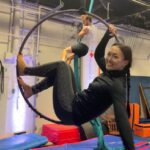
Rose Edu felt like a fraud. She was 15-going-on-16 when she moved to Canada to study, with no friends or immediate family nearby.
It was still an exciting time, as Edu had always dreamed of living and studying in an English-speaking country.
Still, it was tough, especially when you’re that young and making decisions without your parents by your side.
“Coming from Nigeria to Canada, there’s the not knowing if you have the right answers,” she says. “Or, if you know enough to be able to get by, and that sort of hindered me in speaking up or even pursuing activities or opportunities.”
Edu was feeling the symptoms of impostor syndrome.
What is impostor syndrome and how does it affect students?
A person struggling with impostor syndrome “persistently feels like a fraud, disbelieves in the legitimacy of their own success and has a fear of being exposed.”
They believe their “successes and self-worth to external factors like luck, random chance or good will.”
“It’s the feeling that everyone else knows exactly what they’re doing, but you feel lost because you don’t believe you deserve your achievements,” says psychologist Susan Albers, PsyD to Cleveland Clinic.
“You also have this fear that the people around you are going to figure out that you don’t know what you’re talking about and expose you as a fraud.”
It has been portrayed in the media time and again. The main character of the film “Black Swan,” Nina Sayers, is a ballerina with the New York City Ballet who lands the leading, double role of the historic production. While Nina isn’t explicitly stated to experience impostor syndrome, you can see the way she cripples under the weight of her self-doubt and paranoia, until she delivers a perfect on-stage performance with a bloody ending.
That is, of course, an extreme case.
The impostor syndrome we feel is less extreme and pretty common — nearly 70% of people have entertained impostor thoughts at least once in their career.
In students, impostor syndrome can manifest the same way, within and beyond campus.
A student from the Dominican Republic wrote on Medium that when arriving in the US to pursue her undergraduate degree, she started to experience impostor syndrome — part of it due to feeling left out while attending a predominantly White institution.
She felt like the American students were “better” than her, even if it wasn’t true. It affected her grades in participation-based courses, as she struggled to speak up.

It’s common for international students to experience impostor syndrome when they’re adapting to unfamiliar ground. Source: Rose Edu
As a child, Edu was always curious, always wanting to know how things were made. Dolls weren’t so much her forte — she preferred the company of Legos and building things much more.
In school, she participated in various clubs and community projects, including the Junior Engineering Technical Society (JETS). Science and technology quizzes and competitions stimulated her brain better than any other subject; Edu’s lifelong curiosity led to a love of solving problems.
So, it only made sense that she took to mechanical engineering at university like a fish to water, but no club or competition could prepare her for matters of the heart.

Edu when visiting Grindewald, Switzerland. Source: Rose Edu
A systematic review by the National Cancer Institute found that 56% to 82% of international college students experience impostor syndrome, often prompted by feelings of isolation when adapting to a new environment.
Despite how stuck you may feel, there are ways to deal with it.
The student from the Dominican Republic began to ease into her classes as she leveraged her lived experiences, relating them to class content, and realised that her international perspective gives her a competitive advantage.
Meanwhile, Edu says that if there’s something she could tell her younger self for comfort, it’s this:
“It’s not just you — you’re not the only one trying to figure things out. You’re not the only one who is behind,” she says. “If I’d known that, I would have been braver and bolder in pursuing more opportunities at that stage.”

Finding community is essential when navigating impostor syndrome. These are the Africa and North America booths at INSEAD Cultural Week. Source: Rose Edu
Today, Edu is an Ontario Tech graduate who has worked in process engineering teams across global companies like ArcelorMittal Dofasco and the Canadian Imperial Bank of Commerce (CIBC).
In 2024, she decided to shift gears, choosing to pursue an MBA at INSEAD, the world’s top business school. The programme started in France, and now she has just moved to Singapore to conquer the latter half.
Edu has grown since her days in Canada. She’s making the most of her international experience, equipping herself with the tools to one day return to Nigeria and contribute to her next passion: improving the education system.
There’s no shortage of talent in Africa, after all, and if there’s one person who understands the trials of reaching for your dreams, it’s her.
Now that she’s attending a prestigious institution like INSEAD, she knows not to let impostor syndrome get the best of her, since she’s already overcome it in the past.
“I know now to just go for the opportunities that I want, and put myself out there without letting any of those things hold me back — I think we all have various strengths and areas of improvement,” she says.







